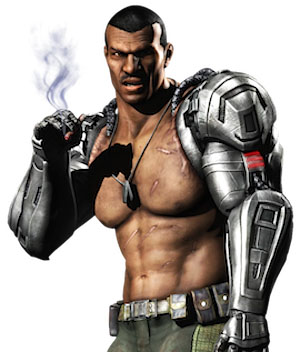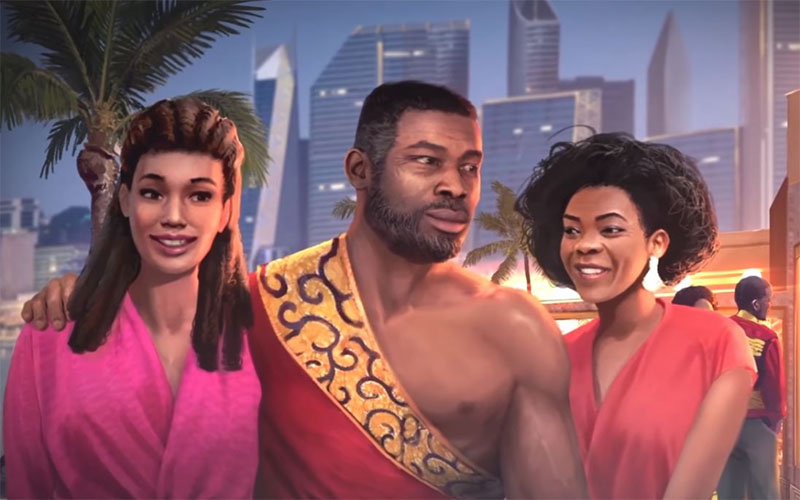Last month, the highly anticipated video game Mortal Kombat 11 (MK11) was released to an excited yet wary fighting game community. Game studio NetherRealm’s newest incarnation received praise from both fans and critics for its simplistic yet entertaining combat system, its thrilling cinematic cutscenes, and the reintroduction of original and beloved characters. However, despite its success the game was given little time to rest on its laurels, as a subset of white male fans immediately began to criticize one particular choice in one character’s story. The game featured a compelling tale in which the two separate timelines of Mortal Kombat merged to finish an ongoing plot branching all the way back to MK’s 2006 game Mortal Kombat Armageddon. As a result of this temporal shift, fan favorite black “kombatant” Jackson Briggs (or “Jax”) was given a fascinating story ending, in which he gains the ability to rewrite time, a power he subsequently uses to create a history in which slavery does not exist. While most saw this ending as benign, and even progressive, some fans took to YouTube and Reddit claiming the ending was not only uncharacteristic of the American soldier, but also, and perhaps more contentiously, was a part of an ongoing pattern of game developers shoehorning “liberal politics” into popular franchises.

Jax from Mortal Kombat, WikiCommons
At this point, this argument is old hat. This is just one of many recent incidents in which a disgruntled minority of white and male members of the broader gaming community have expressed displeasure towards perceived “liberal” ideologies. This sentiment is summed up by one Reddit user who said, “Of all the games I never would have believed to fall for this ‘woke’ bullshit, it would be MK.” The supposed controversy around Jax is indicative of a greater problem of race within gaming. While it would be easy to write off anyone opposed to ending slavery (virtual or otherwise) as racist, I believe we can use this controversy and others like it as opportunities to take a closer look at some of the many kindles that fuel this fire. While race is of course at the center of this story of a video game character erasing this country’s history of slavery, there are other structural issues in play. Taking a closer look at the fan outrage reveals issues of capital, sincerity, and erasure, prompting the question: when is it acceptable for game developers to experiment with the narratives of the disenfranchised?
MK is no stranger to controversy. In 1993 the game played a key role in the congressional hearing on violent video games, in which Sen. Joseph Lieberman responded to public outcry by using footage of MK’s graphic fatalities to raise concerns about the effects of violent video games on children—an argument recently repeated by the current presidential administration just last year. While not the only game displayed, MK was by far the most popular within the 1993 hearing, and the following year it was immortalized as one of the primary factors for the establishment of the ESRB rating system. This system, developed by a union of game companies, is still used today to rate video games based on suitable content for certain age groups; Mortal Kombat games have historically been rated M for Mature, ages 17+. Based on this history, it could be argued that the game has always been politically contentious. But more importantly, the hearing was one of the first times in which both game developers and distributors were forced to reflect on the products they released, prompting the companies to also reflect on the desires of the public or risk being blacklisted and losing massive profit.

The Senate debates violence in video games in 1993; screenshot from C-SPAN
This leaves us in rather murky territory. While these events eventually led to the self-censorship of the industry, it is important to note that companies only started to change their practices once pressed by the public. By extension, one could ask: do game developers create diverse narratives out of sincerity or out of a need to remain legible to the broader public? This question runs through the heart of the Jax controversy. Has NetherRealm provided us with a sincere attempt at diversity, or have they engaged with “liberal politics” only to remain relevant to an increasingly vocal public? While arguments could be made for both sides, I assert that this is too narrow an approach, as corporate decision-making is always blurred by capital incentives. Instead, I urge us to look at how game development companies are making these additions, and what is and is not lost in the process.
What does it mean to erase slavery? Are the developers erasing all slavery? Or do they mean only the enslavement of African bodies? The fact that the game only displayed black figures in Jax’s ending and gave it an Afro-centric theme would suggest that the developers are attempting to key into the black experience of living in a post-slavery world. While this might be admirable, it raises its own concerns. There are many who choose not to engage with this country’s racist history, and what whiter resolution to racial tension exists than to pretend that race doesn’t exist, or manifest a world where difference is erased? I read this narrative as the product of a white liberal fantasy. While Jax’s choice to delete slavery does indeed cater to black players—who might relish the erasure of a painful history—it also satisfies a desire of white players who, by seeing Jax erasing slavery, get to momentarily erase white guilt tied to this history, receiving a moment of solace from the harshness of engaging with race at all.

Jax in a world without slavery, screenshot from MK11
My goal is not to accuse NetherRealm of any misdeed, nor to give weight to the arguments presented above. In fact, I credit NetherRealm for their attempt at inclusivity and introduction of novel counter-narratives. I believe Jax’s ending serves an important role in disrupting the hegemonic white male fantasy (especially rampant in gaming) and succeeds in providing alternate views to blackness. However, it cannot be ignored that this ending stems from a history of game companies responding to a changing political climate to sell games to an increasingly vocal player base; Jax’s ending does not exactly escape from the overbearing nature of whiteness. For these reasons, I argue we must continue to critically and ethnographically engage with game narratives alongside accompanying fan dialogue, to hold accountable both game developers and fans alike.

1 Comment
Definitely something to think about. Not to turn the spotlight off, but to attempt to highlight the many questions the story raises, as you mentioned: what about slavery in other countries and continents? Many other races have faced slavery and indentured servitude. By making it, as you said, “Afro-centric”, and excluding more details, I think that NetherRealms are towing the line between trying to cater to a more diverse fanbase and actually trying to resonate and positively impact gamers without any corporate agenda.
1 Trackback